Employee Motivation and Management: A Tesco Case Study Report
VerifiedAdded on 2022/11/16
|9
|1672
|426
Report
AI Summary
This report provides an in-depth analysis of employee motivation within Tesco, focusing on the application of Maslow's Hierarchy of Needs and Herzberg's Two-Factor Theory. The study examines how Tesco, including its discount store Jack, utilizes these motivational theories to enhance employee productivity and morale. The report delves into the advantages and disadvantages of each theory, providing insights into their practical implications within the company. It explores how Tesco addresses physiological, security, social, esteem, and self-actualization needs, as well as the importance of hygiene and motivational factors. The analysis considers factors such as working conditions, employee involvement, and career progression, offering a comprehensive understanding of Tesco's approach to human resource management and employee engagement. The report concludes with a summary of key findings and recommendations for optimizing employee motivation strategies.
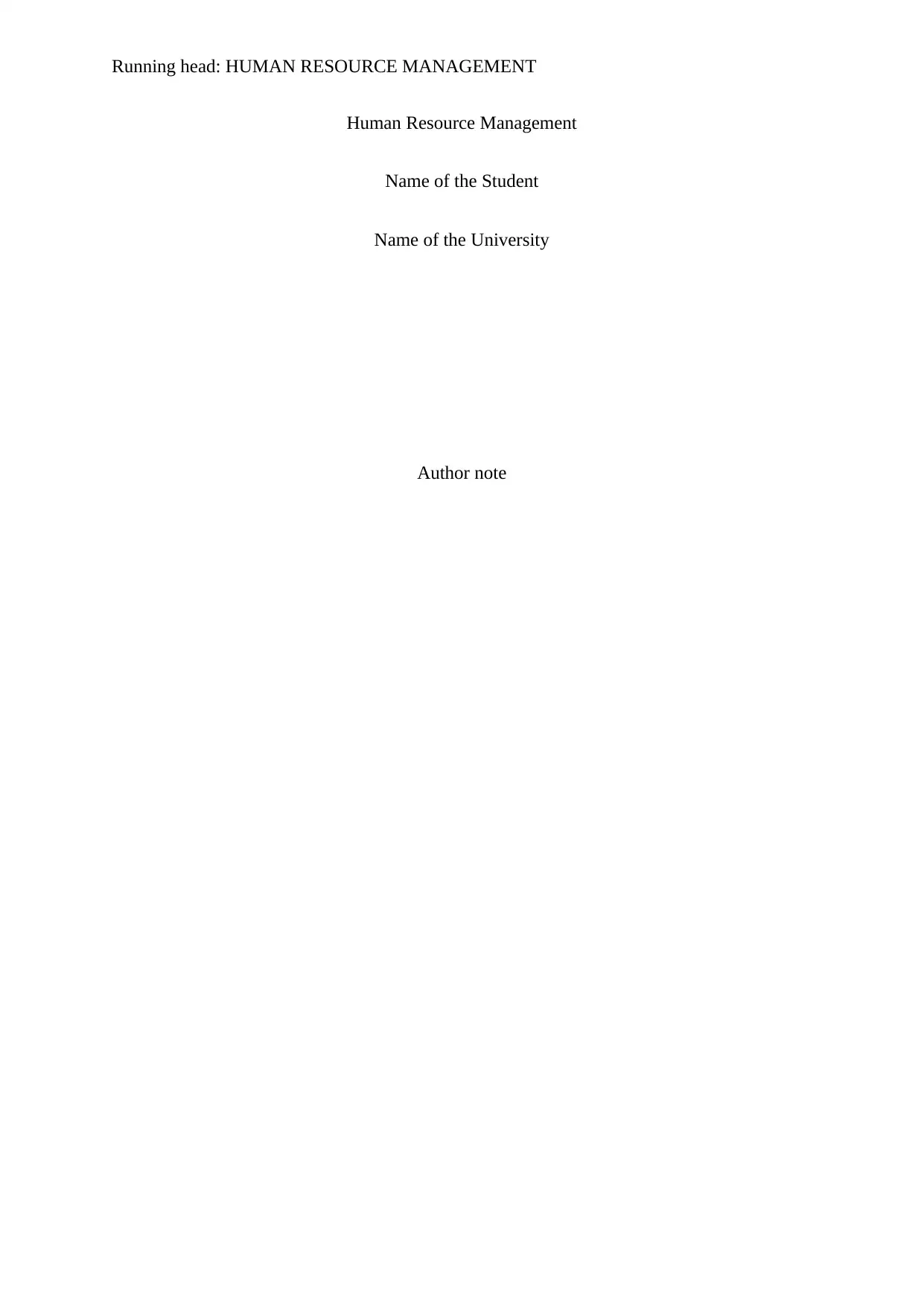
Running head: HUMAN RESOURCE MANAGEMENT
Human Resource Management
Name of the Student
Name of the University
Author note
Human Resource Management
Name of the Student
Name of the University
Author note
Paraphrase This Document
Need a fresh take? Get an instant paraphrase of this document with our AI Paraphraser
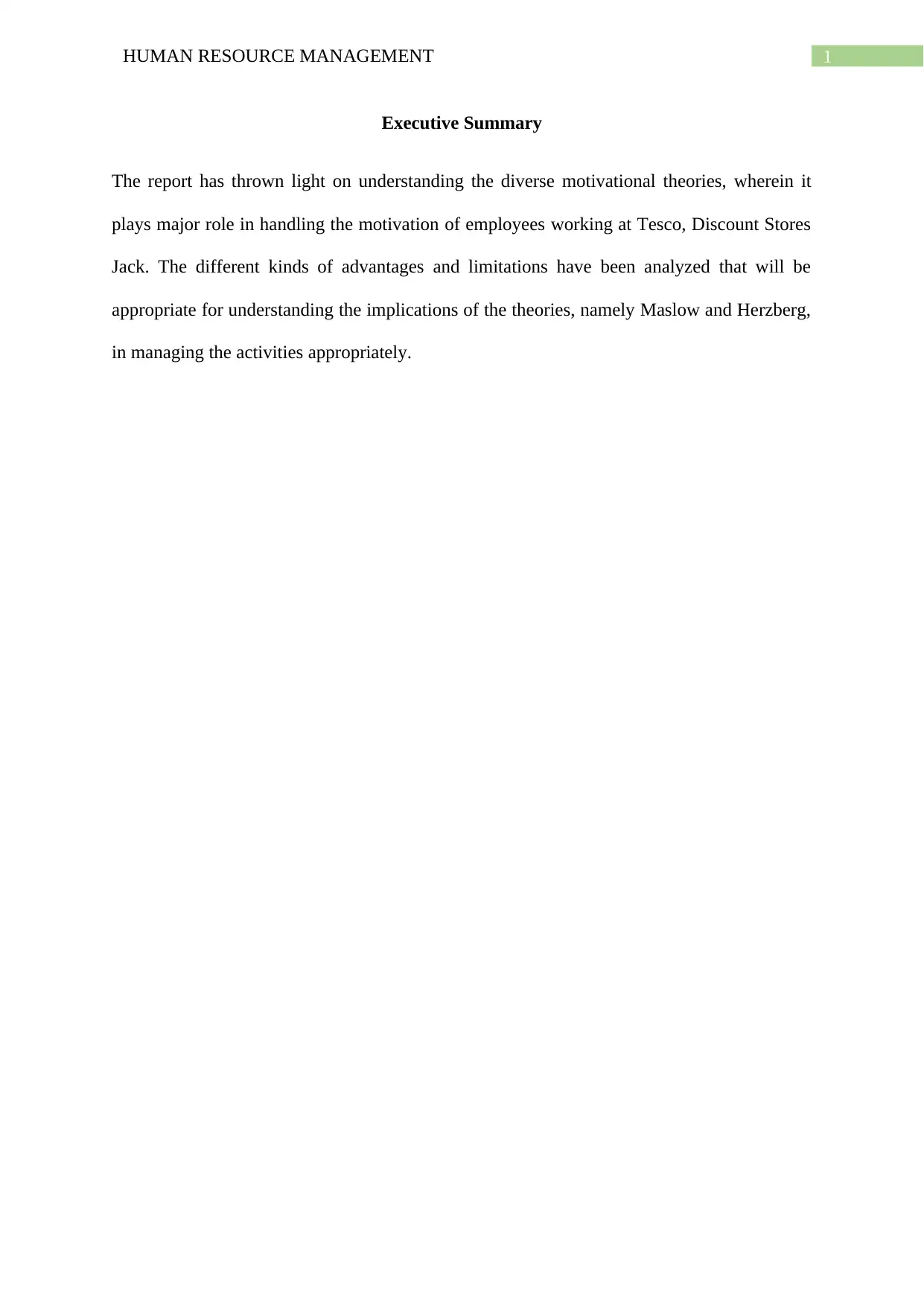
1HUMAN RESOURCE MANAGEMENT
Executive Summary
The report has thrown light on understanding the diverse motivational theories, wherein it
plays major role in handling the motivation of employees working at Tesco, Discount Stores
Jack. The different kinds of advantages and limitations have been analyzed that will be
appropriate for understanding the implications of the theories, namely Maslow and Herzberg,
in managing the activities appropriately.
Executive Summary
The report has thrown light on understanding the diverse motivational theories, wherein it
plays major role in handling the motivation of employees working at Tesco, Discount Stores
Jack. The different kinds of advantages and limitations have been analyzed that will be
appropriate for understanding the implications of the theories, namely Maslow and Herzberg,
in managing the activities appropriately.
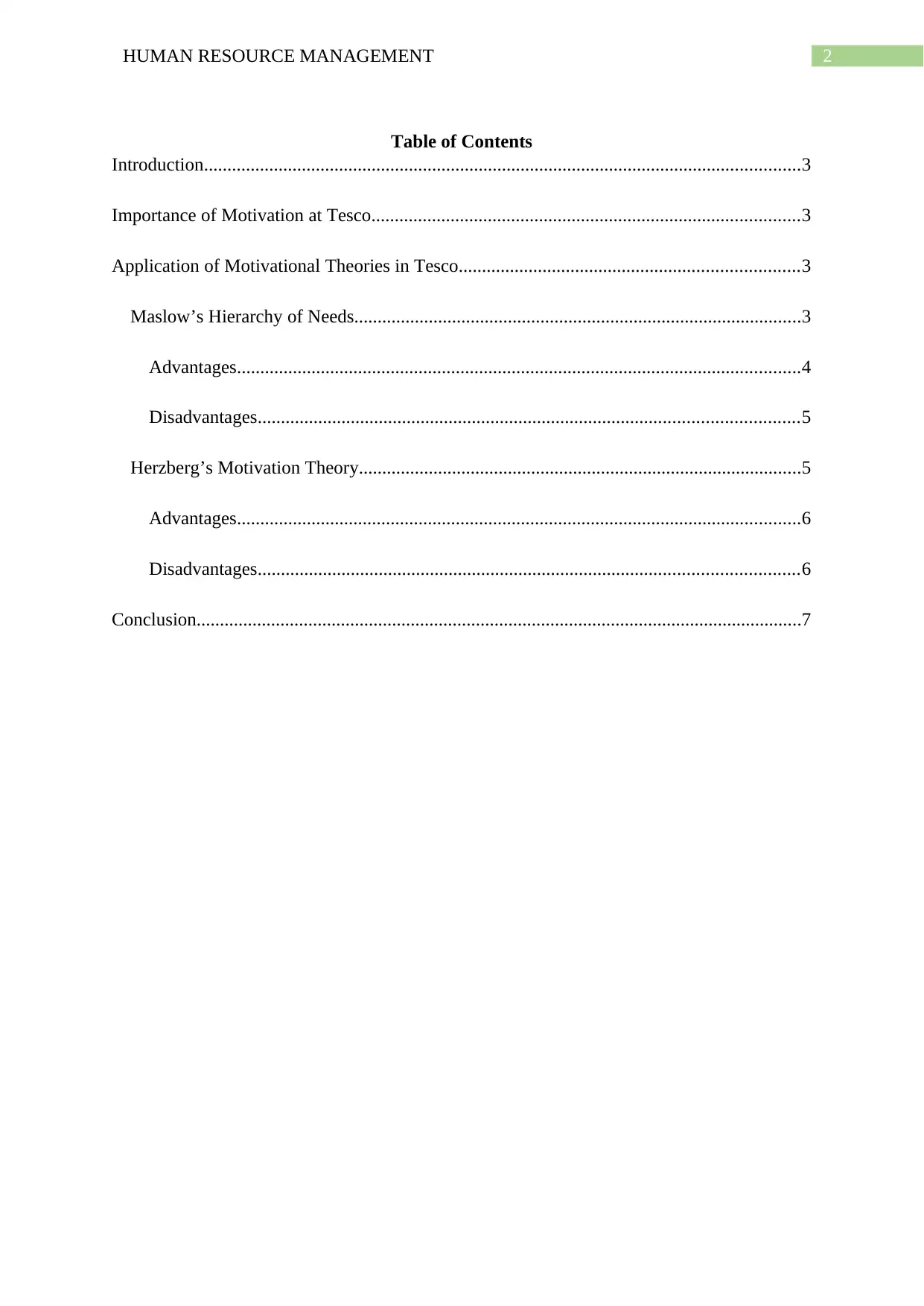
2HUMAN RESOURCE MANAGEMENT
Table of Contents
Introduction................................................................................................................................3
Importance of Motivation at Tesco............................................................................................3
Application of Motivational Theories in Tesco.........................................................................3
Maslow’s Hierarchy of Needs................................................................................................3
Advantages.........................................................................................................................4
Disadvantages....................................................................................................................5
Herzberg’s Motivation Theory...............................................................................................5
Advantages.........................................................................................................................6
Disadvantages....................................................................................................................6
Conclusion..................................................................................................................................7
Table of Contents
Introduction................................................................................................................................3
Importance of Motivation at Tesco............................................................................................3
Application of Motivational Theories in Tesco.........................................................................3
Maslow’s Hierarchy of Needs................................................................................................3
Advantages.........................................................................................................................4
Disadvantages....................................................................................................................5
Herzberg’s Motivation Theory...............................................................................................5
Advantages.........................................................................................................................6
Disadvantages....................................................................................................................6
Conclusion..................................................................................................................................7
⊘ This is a preview!⊘
Do you want full access?
Subscribe today to unlock all pages.

Trusted by 1+ million students worldwide
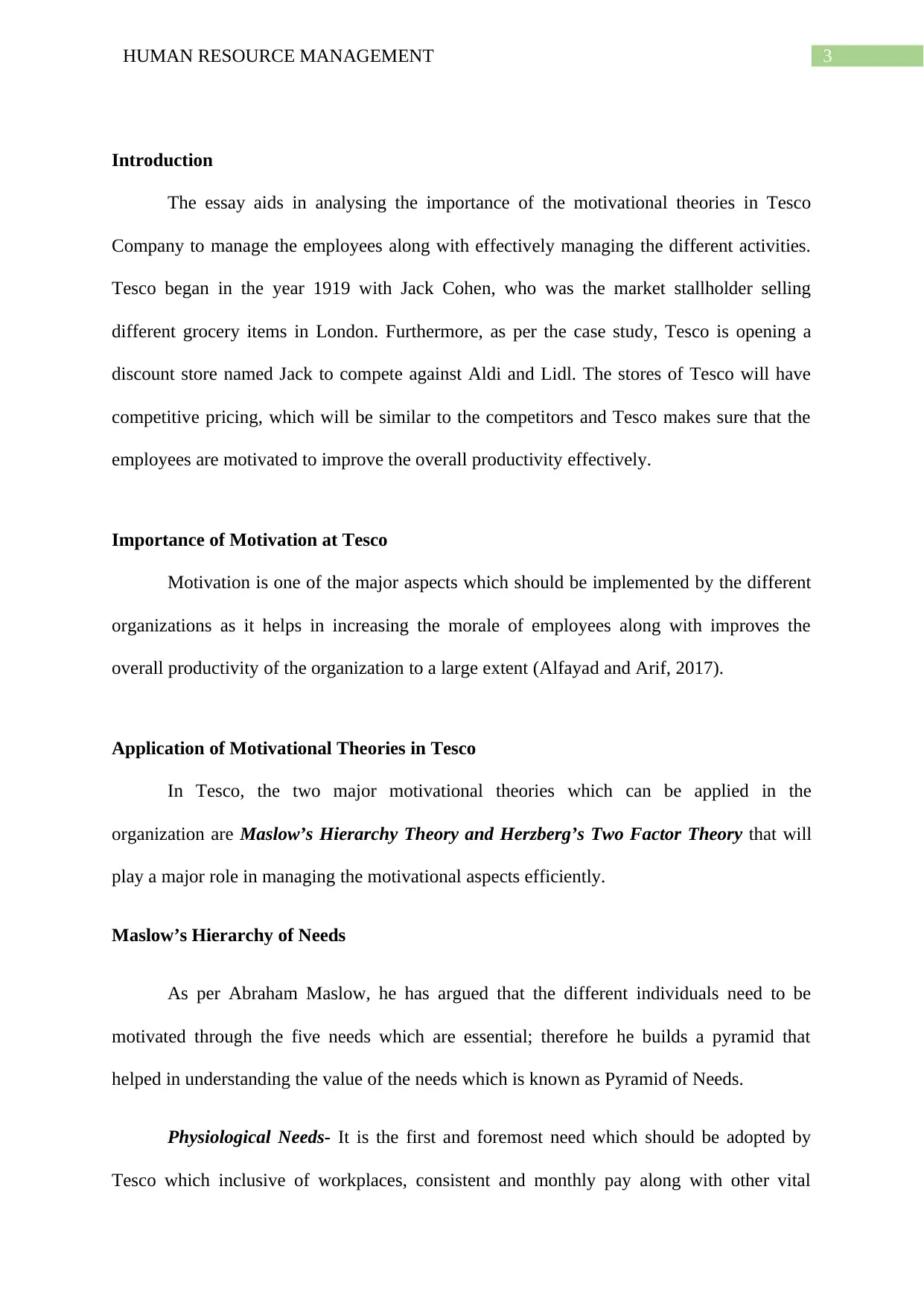
3HUMAN RESOURCE MANAGEMENT
Introduction
The essay aids in analysing the importance of the motivational theories in Tesco
Company to manage the employees along with effectively managing the different activities.
Tesco began in the year 1919 with Jack Cohen, who was the market stallholder selling
different grocery items in London. Furthermore, as per the case study, Tesco is opening a
discount store named Jack to compete against Aldi and Lidl. The stores of Tesco will have
competitive pricing, which will be similar to the competitors and Tesco makes sure that the
employees are motivated to improve the overall productivity effectively.
Importance of Motivation at Tesco
Motivation is one of the major aspects which should be implemented by the different
organizations as it helps in increasing the morale of employees along with improves the
overall productivity of the organization to a large extent (Alfayad and Arif, 2017).
Application of Motivational Theories in Tesco
In Tesco, the two major motivational theories which can be applied in the
organization are Maslow’s Hierarchy Theory and Herzberg’s Two Factor Theory that will
play a major role in managing the motivational aspects efficiently.
Maslow’s Hierarchy of Needs
As per Abraham Maslow, he has argued that the different individuals need to be
motivated through the five needs which are essential; therefore he builds a pyramid that
helped in understanding the value of the needs which is known as Pyramid of Needs.
Physiological Needs- It is the first and foremost need which should be adopted by
Tesco which inclusive of workplaces, consistent and monthly pay along with other vital
Introduction
The essay aids in analysing the importance of the motivational theories in Tesco
Company to manage the employees along with effectively managing the different activities.
Tesco began in the year 1919 with Jack Cohen, who was the market stallholder selling
different grocery items in London. Furthermore, as per the case study, Tesco is opening a
discount store named Jack to compete against Aldi and Lidl. The stores of Tesco will have
competitive pricing, which will be similar to the competitors and Tesco makes sure that the
employees are motivated to improve the overall productivity effectively.
Importance of Motivation at Tesco
Motivation is one of the major aspects which should be implemented by the different
organizations as it helps in increasing the morale of employees along with improves the
overall productivity of the organization to a large extent (Alfayad and Arif, 2017).
Application of Motivational Theories in Tesco
In Tesco, the two major motivational theories which can be applied in the
organization are Maslow’s Hierarchy Theory and Herzberg’s Two Factor Theory that will
play a major role in managing the motivational aspects efficiently.
Maslow’s Hierarchy of Needs
As per Abraham Maslow, he has argued that the different individuals need to be
motivated through the five needs which are essential; therefore he builds a pyramid that
helped in understanding the value of the needs which is known as Pyramid of Needs.
Physiological Needs- It is the first and foremost need which should be adopted by
Tesco which inclusive of workplaces, consistent and monthly pay along with other vital
Paraphrase This Document
Need a fresh take? Get an instant paraphrase of this document with our AI Paraphraser
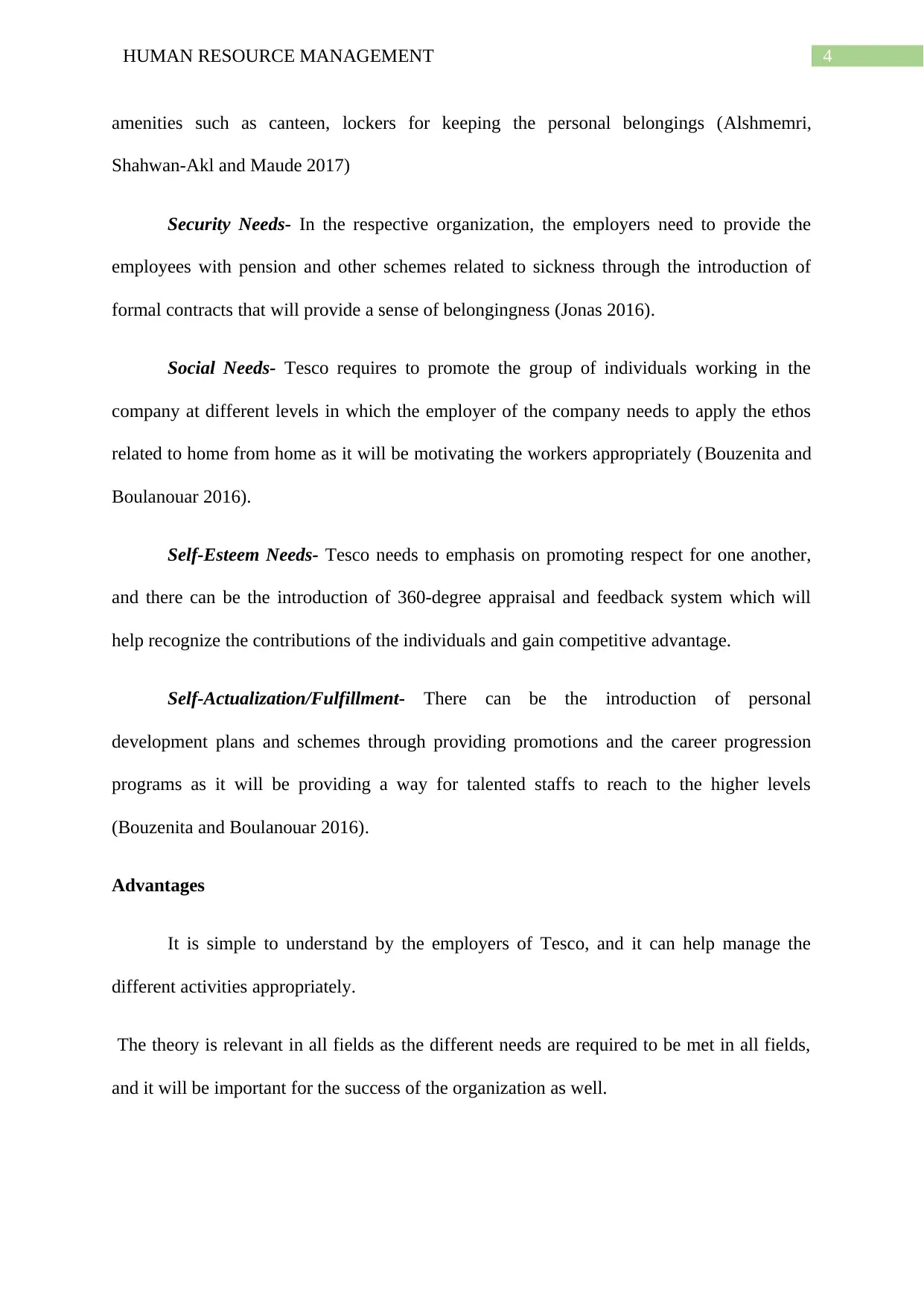
4HUMAN RESOURCE MANAGEMENT
amenities such as canteen, lockers for keeping the personal belongings (Alshmemri,
Shahwan-Akl and Maude 2017)
Security Needs- In the respective organization, the employers need to provide the
employees with pension and other schemes related to sickness through the introduction of
formal contracts that will provide a sense of belongingness (Jonas 2016).
Social Needs- Tesco requires to promote the group of individuals working in the
company at different levels in which the employer of the company needs to apply the ethos
related to home from home as it will be motivating the workers appropriately (Bouzenita and
Boulanouar 2016).
Self-Esteem Needs- Tesco needs to emphasis on promoting respect for one another,
and there can be the introduction of 360-degree appraisal and feedback system which will
help recognize the contributions of the individuals and gain competitive advantage.
Self-Actualization/Fulfillment- There can be the introduction of personal
development plans and schemes through providing promotions and the career progression
programs as it will be providing a way for talented staffs to reach to the higher levels
(Bouzenita and Boulanouar 2016).
Advantages
It is simple to understand by the employers of Tesco, and it can help manage the
different activities appropriately.
The theory is relevant in all fields as the different needs are required to be met in all fields,
and it will be important for the success of the organization as well.
amenities such as canteen, lockers for keeping the personal belongings (Alshmemri,
Shahwan-Akl and Maude 2017)
Security Needs- In the respective organization, the employers need to provide the
employees with pension and other schemes related to sickness through the introduction of
formal contracts that will provide a sense of belongingness (Jonas 2016).
Social Needs- Tesco requires to promote the group of individuals working in the
company at different levels in which the employer of the company needs to apply the ethos
related to home from home as it will be motivating the workers appropriately (Bouzenita and
Boulanouar 2016).
Self-Esteem Needs- Tesco needs to emphasis on promoting respect for one another,
and there can be the introduction of 360-degree appraisal and feedback system which will
help recognize the contributions of the individuals and gain competitive advantage.
Self-Actualization/Fulfillment- There can be the introduction of personal
development plans and schemes through providing promotions and the career progression
programs as it will be providing a way for talented staffs to reach to the higher levels
(Bouzenita and Boulanouar 2016).
Advantages
It is simple to understand by the employers of Tesco, and it can help manage the
different activities appropriately.
The theory is relevant in all fields as the different needs are required to be met in all fields,
and it will be important for the success of the organization as well.
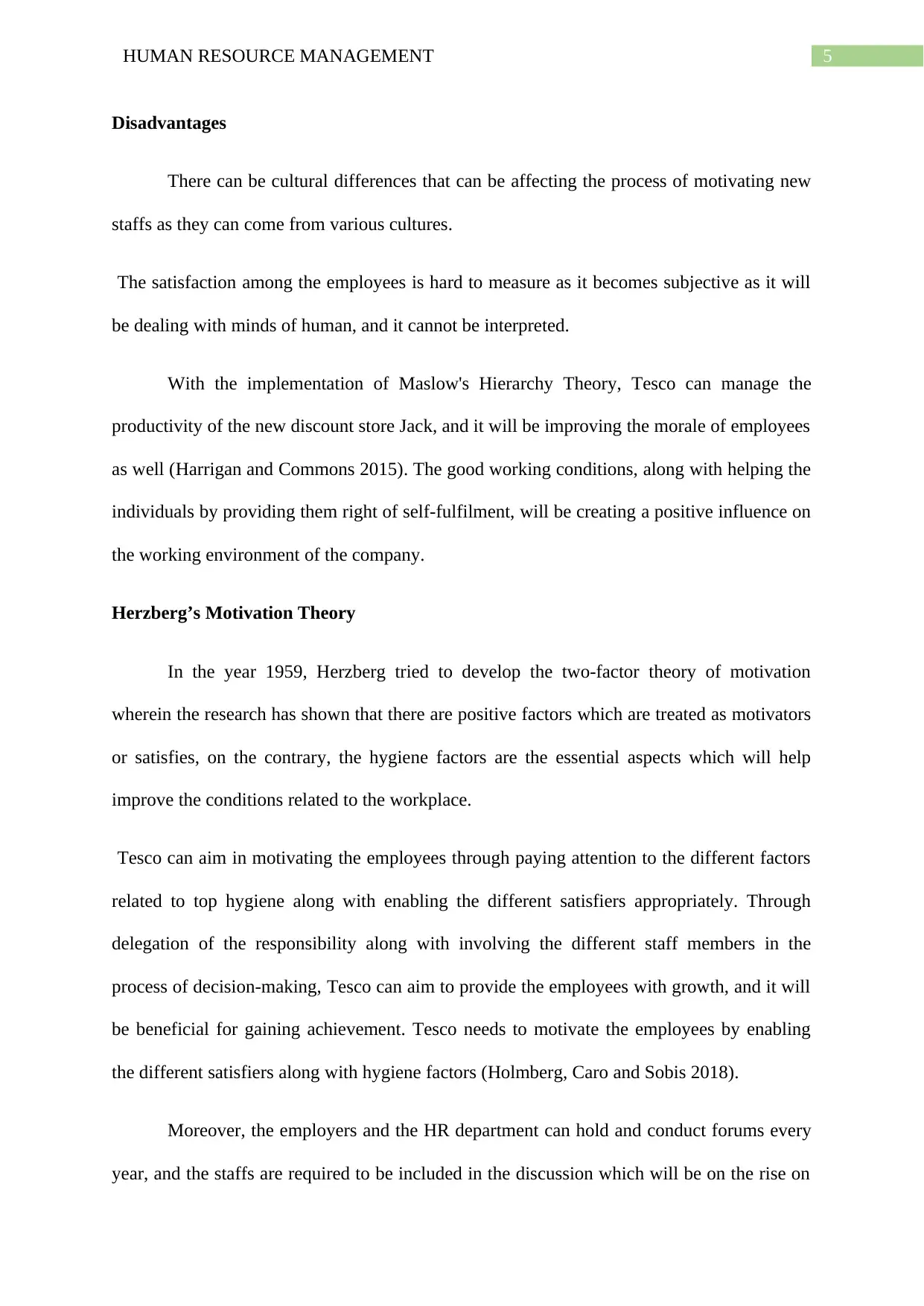
5HUMAN RESOURCE MANAGEMENT
Disadvantages
There can be cultural differences that can be affecting the process of motivating new
staffs as they can come from various cultures.
The satisfaction among the employees is hard to measure as it becomes subjective as it will
be dealing with minds of human, and it cannot be interpreted.
With the implementation of Maslow's Hierarchy Theory, Tesco can manage the
productivity of the new discount store Jack, and it will be improving the morale of employees
as well (Harrigan and Commons 2015). The good working conditions, along with helping the
individuals by providing them right of self-fulfilment, will be creating a positive influence on
the working environment of the company.
Herzberg’s Motivation Theory
In the year 1959, Herzberg tried to develop the two-factor theory of motivation
wherein the research has shown that there are positive factors which are treated as motivators
or satisfies, on the contrary, the hygiene factors are the essential aspects which will help
improve the conditions related to the workplace.
Tesco can aim in motivating the employees through paying attention to the different factors
related to top hygiene along with enabling the different satisfiers appropriately. Through
delegation of the responsibility along with involving the different staff members in the
process of decision-making, Tesco can aim to provide the employees with growth, and it will
be beneficial for gaining achievement. Tesco needs to motivate the employees by enabling
the different satisfiers along with hygiene factors (Holmberg, Caro and Sobis 2018).
Moreover, the employers and the HR department can hold and conduct forums every
year, and the staffs are required to be included in the discussion which will be on the rise on
Disadvantages
There can be cultural differences that can be affecting the process of motivating new
staffs as they can come from various cultures.
The satisfaction among the employees is hard to measure as it becomes subjective as it will
be dealing with minds of human, and it cannot be interpreted.
With the implementation of Maslow's Hierarchy Theory, Tesco can manage the
productivity of the new discount store Jack, and it will be improving the morale of employees
as well (Harrigan and Commons 2015). The good working conditions, along with helping the
individuals by providing them right of self-fulfilment, will be creating a positive influence on
the working environment of the company.
Herzberg’s Motivation Theory
In the year 1959, Herzberg tried to develop the two-factor theory of motivation
wherein the research has shown that there are positive factors which are treated as motivators
or satisfies, on the contrary, the hygiene factors are the essential aspects which will help
improve the conditions related to the workplace.
Tesco can aim in motivating the employees through paying attention to the different factors
related to top hygiene along with enabling the different satisfiers appropriately. Through
delegation of the responsibility along with involving the different staff members in the
process of decision-making, Tesco can aim to provide the employees with growth, and it will
be beneficial for gaining achievement. Tesco needs to motivate the employees by enabling
the different satisfiers along with hygiene factors (Holmberg, Caro and Sobis 2018).
Moreover, the employers and the HR department can hold and conduct forums every
year, and the staffs are required to be included in the discussion which will be on the rise on
⊘ This is a preview!⊘
Do you want full access?
Subscribe today to unlock all pages.

Trusted by 1+ million students worldwide
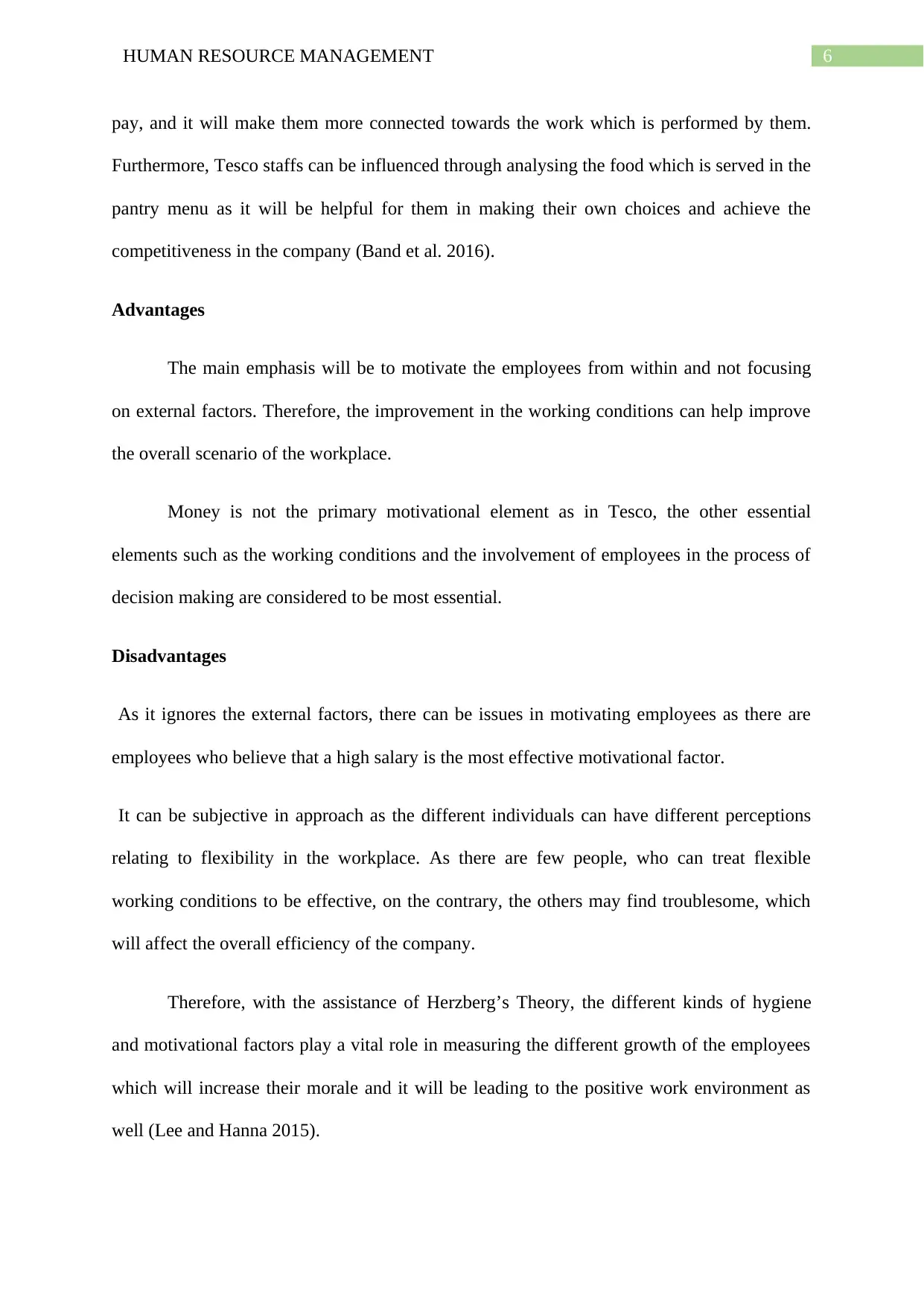
6HUMAN RESOURCE MANAGEMENT
pay, and it will make them more connected towards the work which is performed by them.
Furthermore, Tesco staffs can be influenced through analysing the food which is served in the
pantry menu as it will be helpful for them in making their own choices and achieve the
competitiveness in the company (Band et al. 2016).
Advantages
The main emphasis will be to motivate the employees from within and not focusing
on external factors. Therefore, the improvement in the working conditions can help improve
the overall scenario of the workplace.
Money is not the primary motivational element as in Tesco, the other essential
elements such as the working conditions and the involvement of employees in the process of
decision making are considered to be most essential.
Disadvantages
As it ignores the external factors, there can be issues in motivating employees as there are
employees who believe that a high salary is the most effective motivational factor.
It can be subjective in approach as the different individuals can have different perceptions
relating to flexibility in the workplace. As there are few people, who can treat flexible
working conditions to be effective, on the contrary, the others may find troublesome, which
will affect the overall efficiency of the company.
Therefore, with the assistance of Herzberg’s Theory, the different kinds of hygiene
and motivational factors play a vital role in measuring the different growth of the employees
which will increase their morale and it will be leading to the positive work environment as
well (Lee and Hanna 2015).
pay, and it will make them more connected towards the work which is performed by them.
Furthermore, Tesco staffs can be influenced through analysing the food which is served in the
pantry menu as it will be helpful for them in making their own choices and achieve the
competitiveness in the company (Band et al. 2016).
Advantages
The main emphasis will be to motivate the employees from within and not focusing
on external factors. Therefore, the improvement in the working conditions can help improve
the overall scenario of the workplace.
Money is not the primary motivational element as in Tesco, the other essential
elements such as the working conditions and the involvement of employees in the process of
decision making are considered to be most essential.
Disadvantages
As it ignores the external factors, there can be issues in motivating employees as there are
employees who believe that a high salary is the most effective motivational factor.
It can be subjective in approach as the different individuals can have different perceptions
relating to flexibility in the workplace. As there are few people, who can treat flexible
working conditions to be effective, on the contrary, the others may find troublesome, which
will affect the overall efficiency of the company.
Therefore, with the assistance of Herzberg’s Theory, the different kinds of hygiene
and motivational factors play a vital role in measuring the different growth of the employees
which will increase their morale and it will be leading to the positive work environment as
well (Lee and Hanna 2015).
Paraphrase This Document
Need a fresh take? Get an instant paraphrase of this document with our AI Paraphraser
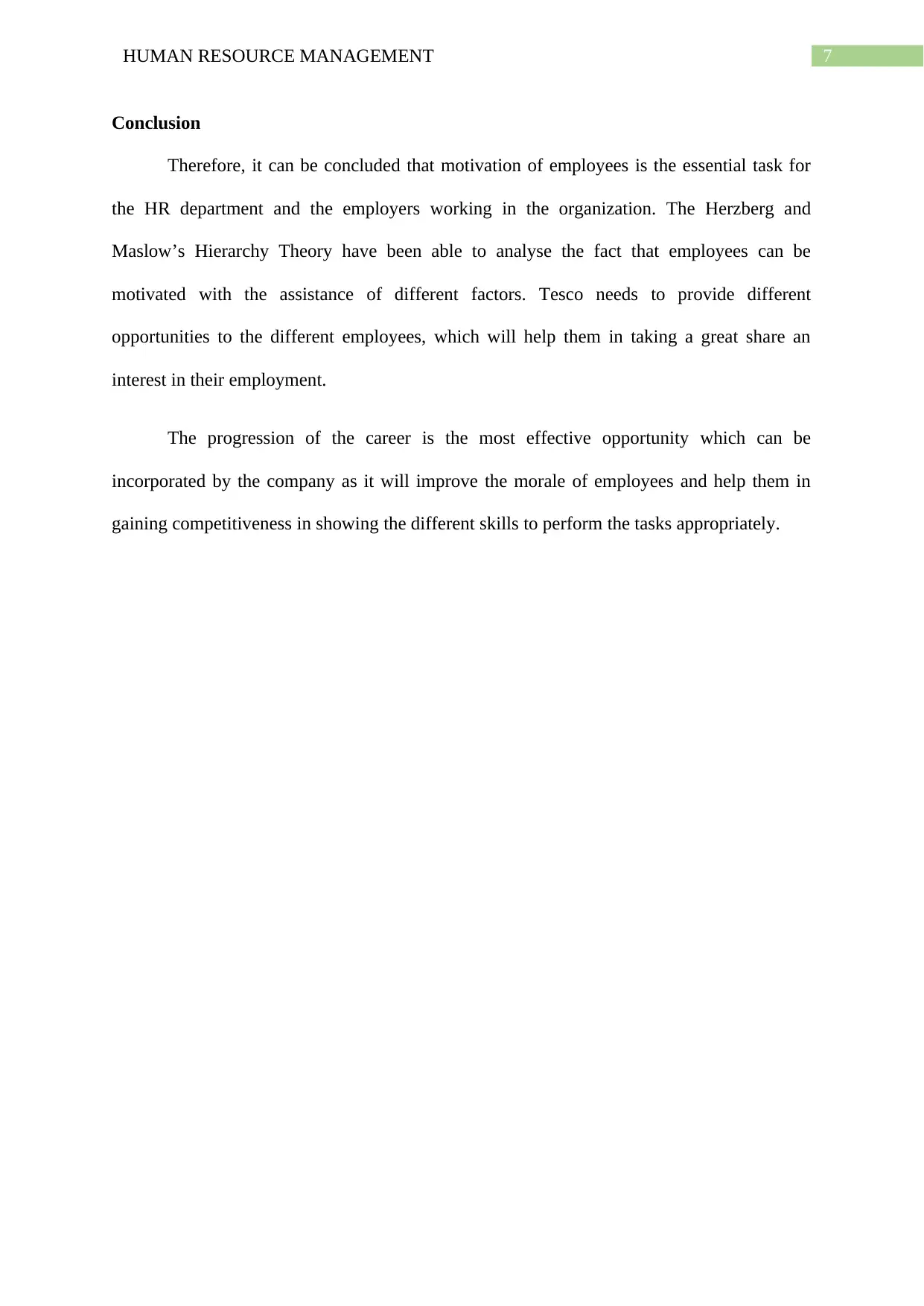
7HUMAN RESOURCE MANAGEMENT
Conclusion
Therefore, it can be concluded that motivation of employees is the essential task for
the HR department and the employers working in the organization. The Herzberg and
Maslow’s Hierarchy Theory have been able to analyse the fact that employees can be
motivated with the assistance of different factors. Tesco needs to provide different
opportunities to the different employees, which will help them in taking a great share an
interest in their employment.
The progression of the career is the most effective opportunity which can be
incorporated by the company as it will improve the morale of employees and help them in
gaining competitiveness in showing the different skills to perform the tasks appropriately.
Conclusion
Therefore, it can be concluded that motivation of employees is the essential task for
the HR department and the employers working in the organization. The Herzberg and
Maslow’s Hierarchy Theory have been able to analyse the fact that employees can be
motivated with the assistance of different factors. Tesco needs to provide different
opportunities to the different employees, which will help them in taking a great share an
interest in their employment.
The progression of the career is the most effective opportunity which can be
incorporated by the company as it will improve the morale of employees and help them in
gaining competitiveness in showing the different skills to perform the tasks appropriately.
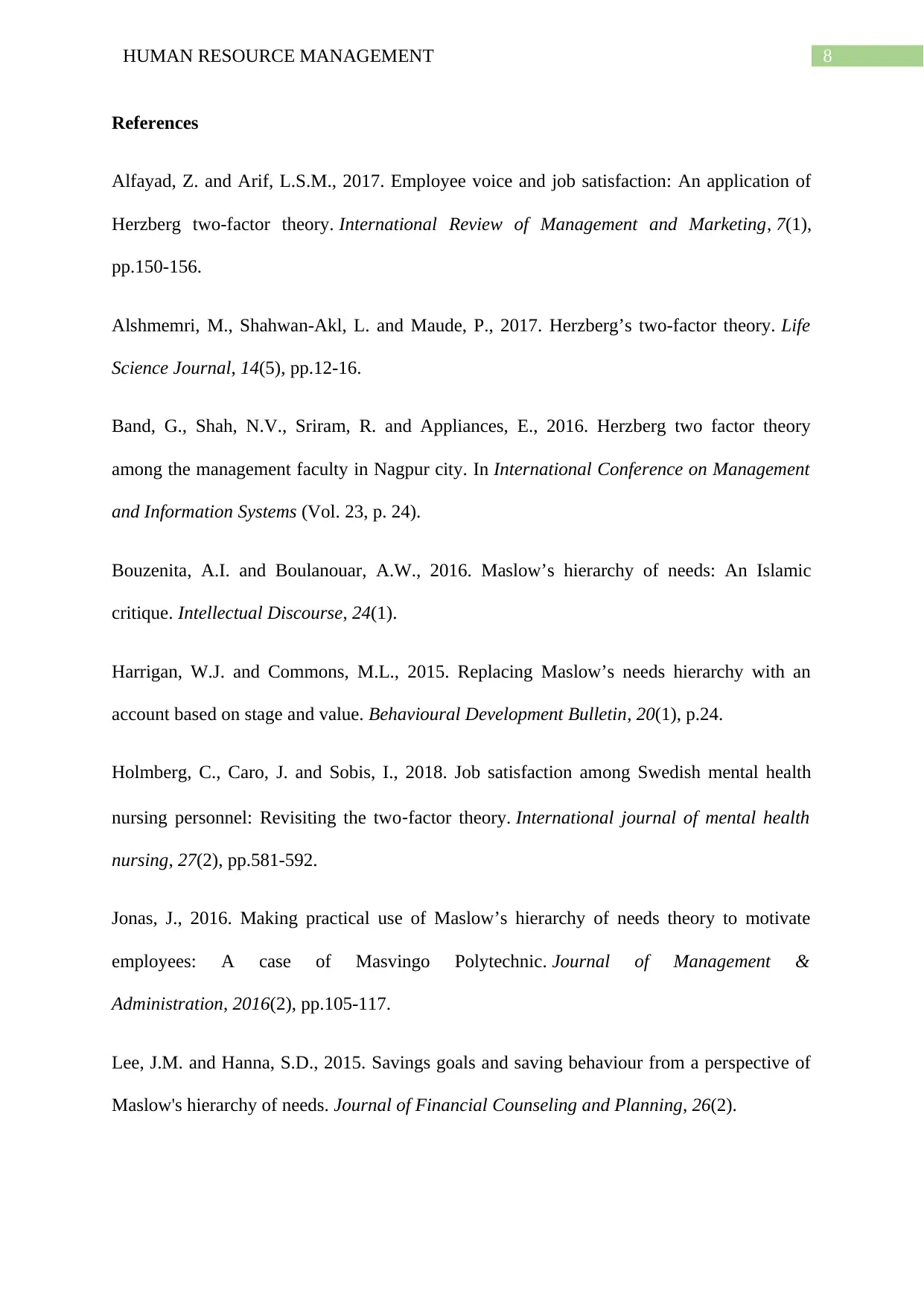
8HUMAN RESOURCE MANAGEMENT
References
Alfayad, Z. and Arif, L.S.M., 2017. Employee voice and job satisfaction: An application of
Herzberg two-factor theory. International Review of Management and Marketing, 7(1),
pp.150-156.
Alshmemri, M., Shahwan-Akl, L. and Maude, P., 2017. Herzberg’s two-factor theory. Life
Science Journal, 14(5), pp.12-16.
Band, G., Shah, N.V., Sriram, R. and Appliances, E., 2016. Herzberg two factor theory
among the management faculty in Nagpur city. In International Conference on Management
and Information Systems (Vol. 23, p. 24).
Bouzenita, A.I. and Boulanouar, A.W., 2016. Maslow’s hierarchy of needs: An Islamic
critique. Intellectual Discourse, 24(1).
Harrigan, W.J. and Commons, M.L., 2015. Replacing Maslow’s needs hierarchy with an
account based on stage and value. Behavioural Development Bulletin, 20(1), p.24.
Holmberg, C., Caro, J. and Sobis, I., 2018. Job satisfaction among Swedish mental health
nursing personnel: Revisiting the two‐factor theory. International journal of mental health
nursing, 27(2), pp.581-592.
Jonas, J., 2016. Making practical use of Maslow’s hierarchy of needs theory to motivate
employees: A case of Masvingo Polytechnic. Journal of Management &
Administration, 2016(2), pp.105-117.
Lee, J.M. and Hanna, S.D., 2015. Savings goals and saving behaviour from a perspective of
Maslow's hierarchy of needs. Journal of Financial Counseling and Planning, 26(2).
References
Alfayad, Z. and Arif, L.S.M., 2017. Employee voice and job satisfaction: An application of
Herzberg two-factor theory. International Review of Management and Marketing, 7(1),
pp.150-156.
Alshmemri, M., Shahwan-Akl, L. and Maude, P., 2017. Herzberg’s two-factor theory. Life
Science Journal, 14(5), pp.12-16.
Band, G., Shah, N.V., Sriram, R. and Appliances, E., 2016. Herzberg two factor theory
among the management faculty in Nagpur city. In International Conference on Management
and Information Systems (Vol. 23, p. 24).
Bouzenita, A.I. and Boulanouar, A.W., 2016. Maslow’s hierarchy of needs: An Islamic
critique. Intellectual Discourse, 24(1).
Harrigan, W.J. and Commons, M.L., 2015. Replacing Maslow’s needs hierarchy with an
account based on stage and value. Behavioural Development Bulletin, 20(1), p.24.
Holmberg, C., Caro, J. and Sobis, I., 2018. Job satisfaction among Swedish mental health
nursing personnel: Revisiting the two‐factor theory. International journal of mental health
nursing, 27(2), pp.581-592.
Jonas, J., 2016. Making practical use of Maslow’s hierarchy of needs theory to motivate
employees: A case of Masvingo Polytechnic. Journal of Management &
Administration, 2016(2), pp.105-117.
Lee, J.M. and Hanna, S.D., 2015. Savings goals and saving behaviour from a perspective of
Maslow's hierarchy of needs. Journal of Financial Counseling and Planning, 26(2).
⊘ This is a preview!⊘
Do you want full access?
Subscribe today to unlock all pages.

Trusted by 1+ million students worldwide
1 out of 9
Related Documents
Your All-in-One AI-Powered Toolkit for Academic Success.
+13062052269
info@desklib.com
Available 24*7 on WhatsApp / Email
![[object Object]](/_next/static/media/star-bottom.7253800d.svg)
Unlock your academic potential
Copyright © 2020–2026 A2Z Services. All Rights Reserved. Developed and managed by ZUCOL.





